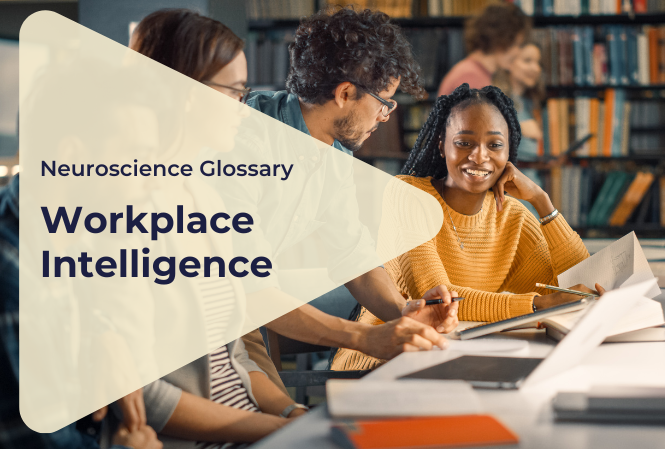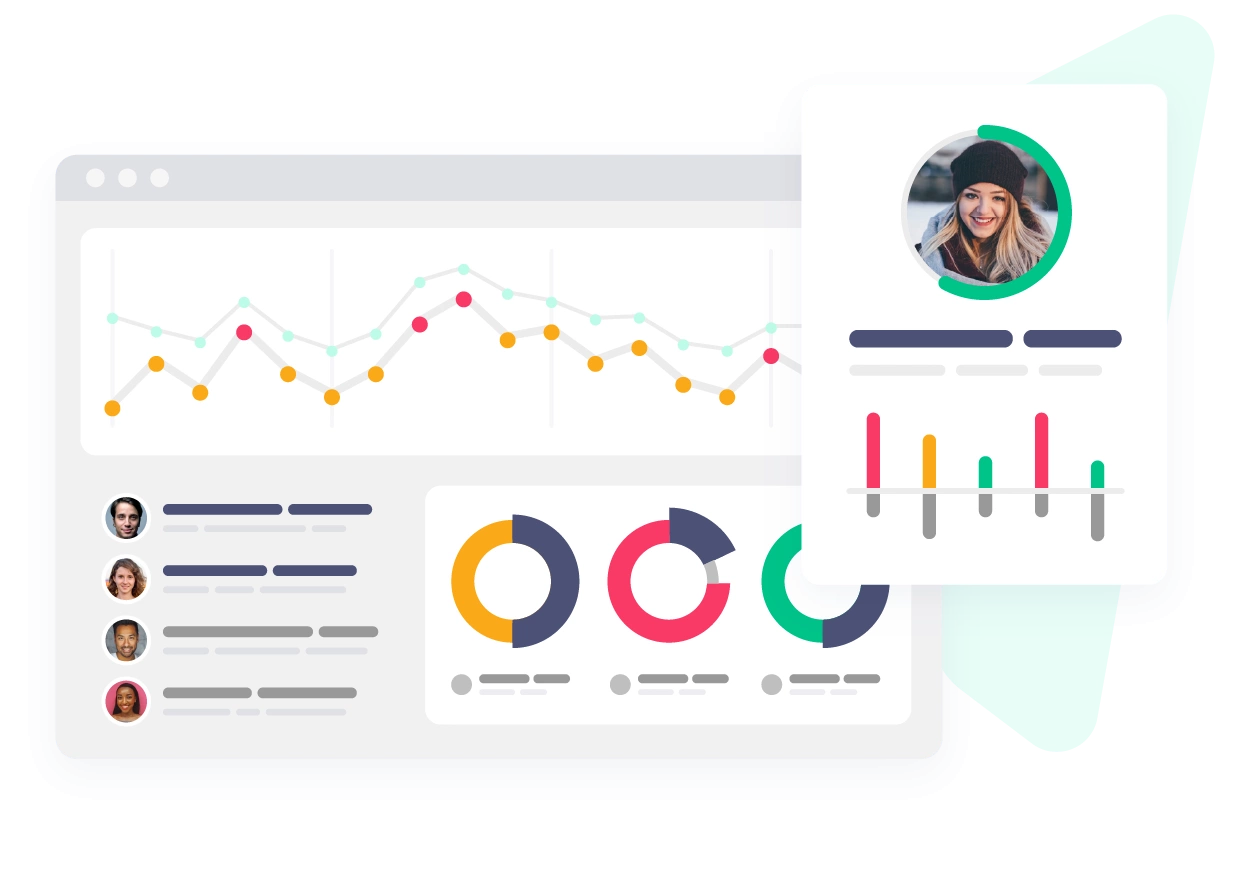
Table of Contents
What is Workplace Intelligence? The Quick Answer
Workplace Intelligence refers to a set of cognitive traits that can predict an individual's job success, regardless of prior experience. It includes qualities like problem-solving, learning, and emotional intelligence.
Workplace Intelligence is different from Personality. The former focuses on candidates' innate abilities, while the latter is more concerned with their natural behaviour in specific situations. Both provide insights into potential success, and whether one or both are used in the selection process depends on the role.
Likewise, different roles require different qualities of Workplace Intelligence. For example, a software developer needs strong problem-solving skills, while a project manager requires proficiency in both problem-solving and emotional intelligence. So there's no universal formula for the ideal combination of Workplace Intelligence qualities; it varies based on role requirements. In fact, these requirements may differ across companies or divisions within the same occupation, depending on hiring managers' preferences.
Want to read more about psychometrics?
There's a lot more information about psychometrics than we can share in this blog post! If you want to learn more, check out our full guide below.
Psychometric Testing GuideHow do you measure Workplace Intelligence?
To measure Workplace Intelligence, candidates must complete an assessment. For graduate hires and knowledge-worker roles, this can replace the CV, providing a more accurate view of candidates' natural abilities to succeed in the job. In a world of generative AI models like ChatGPT, the best candidates must be able to learn, unlearn, and relearn skills in continuous cycles. They need to be strong problem solvers, adaptable to change, have great reasoning skills, and possess high emotional intelligence. All qualities of intelligence in the workplace that can't be scientifically captured in traditional selection tools like CVs and cover letters.
How is a Workplace Intelligence assessment different from traditional aptitude tests?
Traditional aptitude tests
Traditional aptitude tests measure cognitive abilities using a multiple-choice question format. However, with the rise of generative AI like ChatGPT, it's becoming easier to find answers online. This trend is expected to grow as browser plugins make it even faster to access the information needed to fake a test. If you rely on assessments with text or multiple-choice inputs, your selection method may become outdated when it comes to measuring work intelligence.
Psychologists such as Jodoin (2003) and Wolkowitz, Foley, and Zurn (2021) have noted that traditional multiple-choice tests tend to underestimate candidates' abilities. Additionally, a study by Hausdorf, LeBlanc, and Chawla in 2003 revealed that while all candidates are at a disadvantage in question-based tests, candidates from under-represented groups are disproportionately affected. This is because individuals in under-represented groups may experience anxiety in multiple-choice scenarios due to concerns about conforming to stereotypes.
Did you know?
According to psychologists, a better way to measure aptitude and workplace intelligence is through interactive, task-based assessments. These assessments have been proven to be more accurate than traditional question-based formats and can help create larger and more diverse talent pools.
Workplace Intelligence Assessments
Workplace Intelligence assessments replace questions with tasks, designed to create a more engaging candidate experience. Instead of a multiple-choice questionnaire, candidates build their answers step by step, allowing their natural abilities to shine through without fear of prejudice or stereotyping.
This means that every candidate completing a Workplace Intelligence task has a fair chance to showcase their potential, unlike in a multiple choice aptitude test. They also receive an instant feedback report with their own results.
Tasks also offer a scoring method that goes beyond binary "right" or "wrong" answers used in traditional aptitude tests. Initial research shows that candidates who choose the wrong answer in a binary scenario often have 90% of the solution correct. Unfortunately, they are often screened out due to the lack of nuance in the scoring system.
In contrast, tasks allow for a more accurate assessment of candidates' abilities to learn, problem-solving skills, and how they handle complexity. These are qualities highly valued in the modern workplace, where the "right" answer may be uncertain.
In fact, our initial research shows this approach can add an additional 20% of candidates to your talent pool, simply by changing to a task-based assessment method.
Free Playbook: CV-less Hiring
Learn to navigate the skills crisis by looking beyond the CV. Get access to our free in-depth guide on rethinking employment practices, scrapping the CV, and how to implement hiring for potential in your company.
Download the playbook
The result?
Workplace Intelligence from Arctic Shores is the new gold standard in measuring cognitive ability. It’s more accurate at predicting someone’s capability than a 2:1 ever was and it’s less open to manipulation and unintended bias than a question-based psychometric assessment.
It’s empowering progressive TA teams to make smarter hires faster, future-proof their selection process in the age of generative AI, and celebrate diversity –– rather than penalising it.
If you’d like to learn more about how to future-proof your workforce and hire for future potential, not past experience, we’d love to hear from you.
Are you an employer?
Find out how Arctic Shores can help you. Get in touch today to streamline your hiring - improving cost efficiency, reducing time to hire and eliminating bias.
Book a demo
Workplace Intelligence FAQs
Workplace intelligence can be a tricky topic to fully grasp, and it's understandable if you can't take it all in at once! We've written some easily digestable answers to frequently asked questions on the topic below.
> How does Workplace Intelligence differ from personality?
While both provide insight into a candidate's potential, Workplace Intelligence measures innate cognitive traits like learning agility and problem-solving, whereas personality assessments explore behavioral tendencies in specific contexts. Workplace Intelligence focuses on what someone can do, while personality focuses on how they are likely to behave.
> Why are traditional aptitude tests becoming less effective?
Traditional aptitude tests rely on multiple-choice formats that are increasingly vulnerable to manipulation due to tools like generative AI. Research also shows they can underestimate ability and introduce bias, especially for under-represented groups. Task-based assessments offer a fairer, more accurate alternative by evaluating how candidates think and solve problems in real time.
> What makes task-based Workplace Intelligence assessments more inclusive?
Task-based assessments remove the high-pressure format of traditional tests, allowing candidates to demonstrate ability without fear of stereotyping. They evaluate candidates' performance in dynamic, interactive tasks, which are better at identifying true potential and can expand talent pools by up to 20%.
Want to learn more about our assessment?
Or, if you’d like to learn a bit more about our assessment at Arctic Shores, just let us know here. We’ll get back to you pronto.
In the meantime, download our Playbook for CV-less hiring to find out how hiring for potential can transform your hiring process.
Start your Skills-based hiring journey today
Get in touch to understand how our task-based assessment has helped 150+ leading employers future-proof their hiring process.
Contact usRead Next
Sign up for our newsletter to be notified as soon as our next research piece drops.
Join over 2,000 disruptive TA leaders and get insights into the latest trends turning TA on its head in your inbox, every week
Sign up for our newsletter to be notified as soon as our next research piece drops.
Join over 2,000 disruptive TA leaders and get insights into the latest trends turning TA on its head in your inbox, every week


